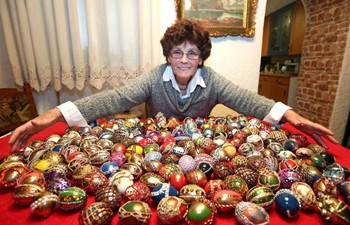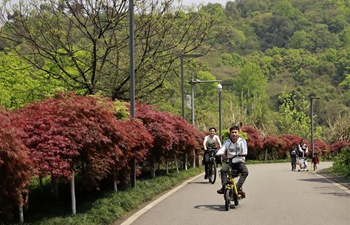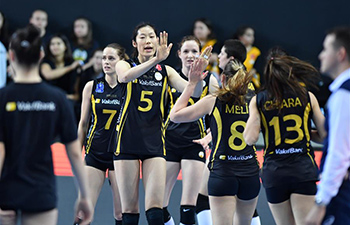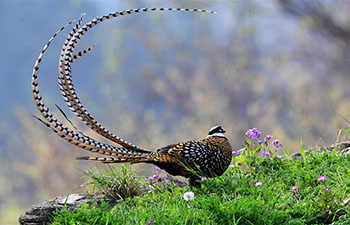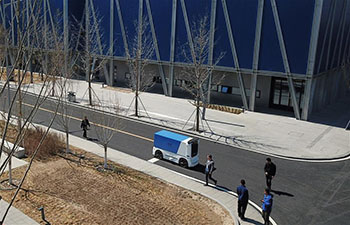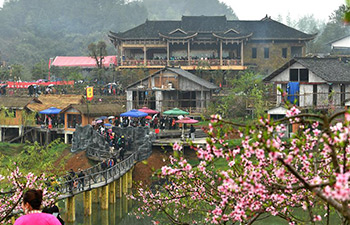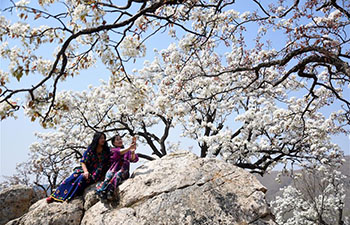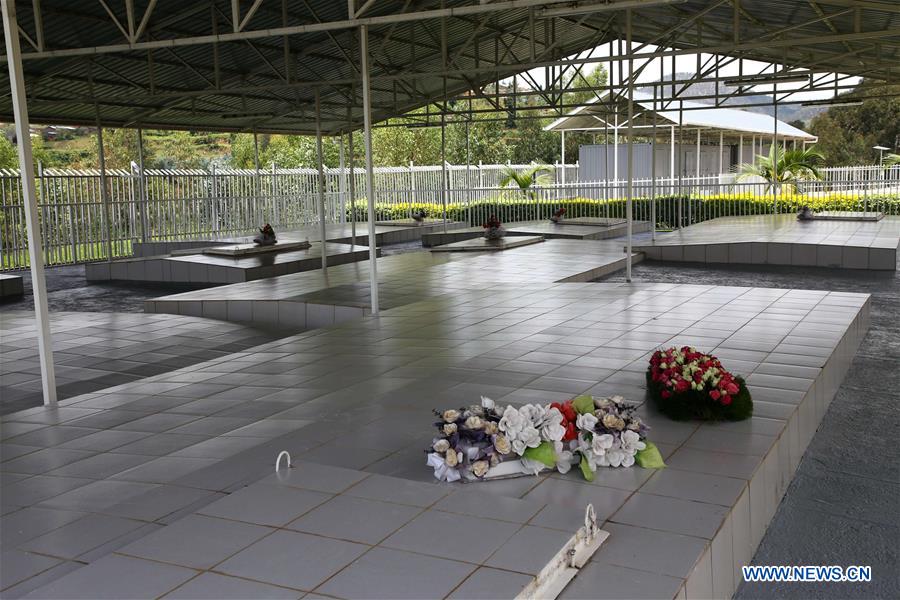
Photo taken on April 3, 2019 shows a mass grave for an estimated 50,000 Tutsi people at the Murambi Genocide Memorial in Nyamagabe district, southern Rwanda. Every year during the 100-day commemoration in line with the period of the genocide, members of churches in the area will go to the Murambi Genocide Memorial to pray for all victims in the genocide, said Celestin Hakizimana, bishop of Gikongoro Catholic Diocese. Under the instruction of Hakizimana, Gikongoro Cathedral's department for reconciliation and healing teaches genocide perpetrators to reintegrate with others and to ask forgiveness. Commemoration, reconciliation and healing have become part of the mission of the 56-year-old in the post-genocidal era, who saved people from the genocide in 1994. (Xinhua/Lyu Tianran)
By Lyu Tianran and James Gashumba
NYAMAGABE, Rwanda, April 5 (Xinhua) -- At least 100 students were attending a retreat at Gikongoro Cathedral in Nyamagabe district, southern Rwanda, ahead of the annual commemoration of the 1994 Rwandan Genocide starting from April 7.
They were being told to embrace love and resist killing by a pastor in the church, near a memorial of seven pastors who were killed during the 100-day genocide.
The Murambi Genocide Memorial, standing about 3 kilometers away from the church, provides the final resting place for an estimated 50,000 Tutsi people who were reported to be massacred in the same tragedy.
Every year during the 100-day commemoration in line with the period of the genocide, members of churches in the area will go to the Murambi Genocide Memorial to pray for all victims in the genocide, said Celestin Hakizimana, bishop of Gikongoro Catholic Diocese.
Apart from the period of the commemoration, they also pray for the victims on special occasions, said Hakizimana, who leads 15 churches in the area including Gikongoro Cathedral.
Under the instruction of Hakizimana, Gikongoro Cathedral's department for reconciliation and healing teaches genocide perpetrators to reintegrate with others and to ask forgiveness.
Commemoration, reconciliation and healing have become part of the mission of the 56-year-old in the post-genocidal era, who saved people from the genocide in 1994.
About 1 million people mainly Tutsi were killed during the genocide. Saint Paul Church in Rwandan capital Kigali where Hakizimana resided at that time provided a safe haven to about 2,000 Tutsi people.
On April 7, 1994, when the genocide started many Tutsi fleeing massacres sought safety at Saint Paul Church, Hakizimana recalled.
"I was protecting people first as a priest. I understood that a priest must treat all people as one family without discrimination," he said.
The then 30-year-old Hutu was asked to register people who were seeking refuge in the church at the beginning days of the genocide.
Nearly a week later, he took charge of protecting the Tutsi people in the church until they were rescued by the Rwanda Patriotic Army, the armed wing of the current ruling party Rwanda Patriotic Front.
During the period of the genocide, he and other priests and church guards thwarted militias' attempts to kill Tutsi people in the church.
Whenever militias attempted to attack the church, he dressed in his robe, standing at the gate and negotiating with them. After receiving alcohol and rice, the militias would leave.
"These were innocent people," he told the militias when being asked why the church was hosting "enemies" of Hutu people.
The militias had wanted to kill him, but fortunately they did not recognize him after he took off the robe.
"My parents didn't inculcate ethnic divisions among us, and several people who were seeking safety at the church were familiar faces since we had met in schools, including teachers and parents (of schoolmates)," he said.
"There was no hatred among us, therefore I felt I could sacrifice to save them," he added.
After the genocide, Hakizimana together with other priests took time to study about trauma and healing, and how ethnic divisions were sowed among Rwandans.
During this year's commemoration, the winner of Protectors of Friendship Pact, awarded by the Rwandan government for his outstanding acts of courage and humanity showed during the genocide, will convene priests and instruct them to guide followers to be at peace and united.

